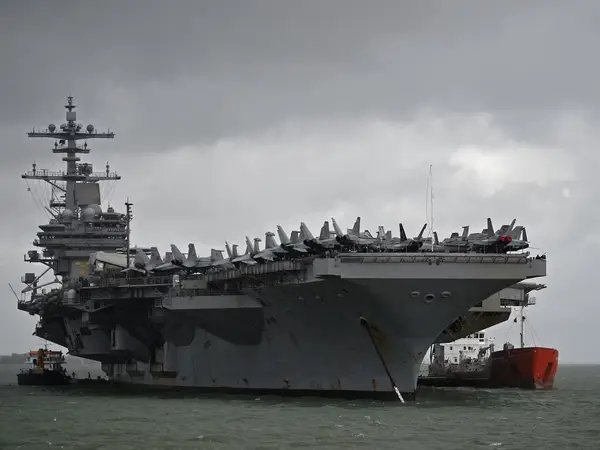The US has decided to extend the deployment of the George H.W. Bush carrier strike group after last week's deadly attacks by Iran-backed forces.
The decision likely means the Bush strike group and its more than 5,000 US forces, which are now in the European Command operational area, will not be returning to home port in the United States on schedule.
US Central Command (CENTCOM) spokesperson Colonel Joe Buccino said: ”The extension of the George HW Bush Carrier Strike Group, inclusive of the USS Leyte Gulf, the USS Delbert D. Black, and the USNS Arctic, allows options to potentially bolster the capabilities of CENTCOM to respond to a range of contingencies in the Middle East.”
Buccino also noted a scheduled, expedited deployment of a squadron of A-10 attack aircraft to the region at a time when many of the country’s forces had been hoping for a withdrawal after an eight-year US deployment where along with Kurdish-led partners, the US is battling against the remnants of Islamic State
News of the deployment came a day after the Pentagon doubled its tally of American troops wounded in last week's attacks in Syria to 12, following the diagnosis of six US military personnel with traumatic brain injuries. The attacks also killed an American contractor and injured another.
President Joe Biden warned Iran last week that the United States would act forcefully to protect Americans. The Pentagon has estimated eight militants were killed during retaliatory US airstrikes against two Iran-linked facilities in Syria during the tit-for-tat exchanges triggered by the first March 23 attack against a US base near the Syrian city of Hasaka.
Meanwhile, a senior member of the Russian military has called the US actions in Syria “provocative”. Russia, which wants the US presence removed from the area to allow it greater control, accused US forces of being spotted in areas outside the agreed zones.
Hundreds of ISIS fighters remain camped in desolate areas where neither the coalition nor the Syrian army exert full control. Russia - which together with Turkey is carrying out joint patrols in northern Syria - has agreed special zones where the coalition can operate.
Russian Rear Admiral Oleg Gurinov, head of the Russian Reconciliation Centre for Syria, told Russian news agency Tass that US forces had been spotted twice in areas which lay outside the agreed zones.
"Provocative actions on the part of US armed forces units have been noted in Hasaka province”, adding that the Russian side has lodged a protest with the coalition.
Russia intervened in the Syrian Civil War in 2015, tipping the balance in President Bashar Al-Assad's favour, leaving in its wake a complicated power struggle. Moscow has since expanded its military facilities in the country with a permanent air base and naval base.
Clearly aligned with Iran, which is supplying Russia with drones being used in its invasion of Ukraine, a Russian presence only strengthens Iranian influence in a region where Iranian proxies continue to wreak havoc.
Of 83 attacks in Iraq and Syria since President Joe Biden took office, just four retaliations have taken place, according to the Pentagon.
Republican lawmakers have demanded a more forceful deterrence against the Iranian regime, arguing that weak responses will invite more attacks on US forces.
